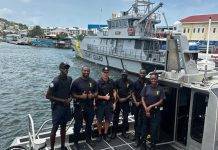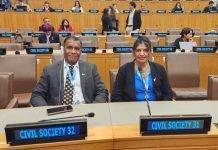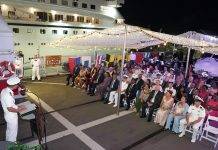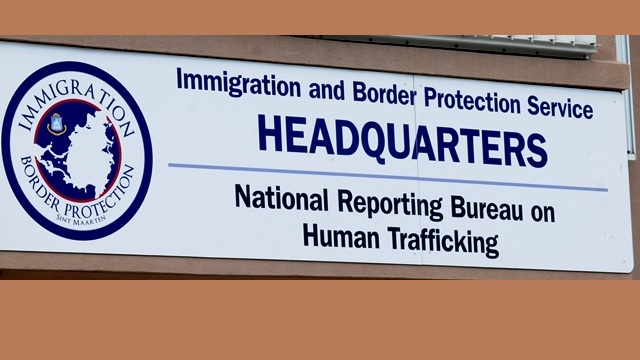Philipsburg – Tuesday August 25, 2015, the Immigration and Border Protection Service (IBP) more specifically the National Reporting Bureau on Human Trafficking (NRB) is making strides in the fight against human trafficking by proactively informing and educating every sector of the community about their bureau’s core tasks and the role we all play in combating Human Trafficking. In addition, the bureau takes pride in publishing the results received from the Department of State in the TIP Report.
The National Reporting Bureau on Human Trafficking (NRB) is the executing agency for prevention and protection of victims of Human Trafficking. After approving the policy on “Temporary residency”, by the Minister of Justice; victims are empowered and are being encouraged to assist in the investigation and prosecution of the offenders of human trafficking. Presently, the National Reporting Bureau on Human Trafficking (NRB) is focused on launching the “Human trafficking and smuggling” awareness campaign. The goal is to inform civil society and other stakeholders about the serious issue of human trafficking and smuggling. Periodically the NRB strategically organizes information sessions for the representatives of the immigrants, with the business community and the tourism sector. It provides information about indicators of Human Trafficking and also about its’ core tasks, to the incoming immigrant and domestic workers, and those working in the adult entertainment industry, who collect their residence permits at the IBP office.
In addition, the NRB makes it a priority to consciously inform immigrant workers of their legal rights and how to report a possible case of human trafficking, it also develops special folders for “Prostitution & Exploitation” and Labor & Exploitation” with information regarding combating exploitation to distribute to these workers.
Not to mention, the quarterly visits the NRB pays to all the local brothels and dance clubs, to cautiously inform them about the core tasks of the NRB and how to contact them to report a possible human trafficking case. The NRB is working diligently to facilitate the flow of communication during these visits by ensuring that there are NRB personnel who speak multiple languages, this is to ensure that the quality of the message remains intact even when being translated. And by specifically organizing a separate info session, the NRB assures that information is certainly provided to the club owners, to ensure their awareness of the core tasks of the NRB and also strictly remind them about the rules and regulations they are required to comply with.
The NRB remains extremely focused on achieving its’ main goal which is bring global awareness to the community at large, this also includes those on the frontlines who may be at one point or another direct contact with potential victim of Human Trafficking. These personnel in the following sectors; Immigration Officers at the different Border points, the Mobile Control Unit and also to the first responders entities like; ambulance, community police, the family doctors and the SMMC personnel. It also works closely with the non-governmental organizations like Anti-Trafficking in Persons (ATIP) and Safe Haven where victims can be housed and sheltered. Since the establishment of the NRB in September 2013, this bureau has received several reports of possible cases of Human Trafficking. Those reports were all alleged cases of labor exploitation.
Each TIP Report narrative contains specific recommendations for a government to consider implementing over the coming year. In addition to the country-specific recommendations within the TIP Report narrative, the Department of State is providing our government with a short suggested action plan that reflects these recommendations. Both the action plan and accompanying recommendations are aimed at providing countries with guidance related to the minimum standards outlined in the Trafficking Victims Protection Act; these standards are generally consistent with the standards set forth in the Protocol to Prevent, Suppress and Punish Trafficking in Persons, Especially Women and Children, supplementing the United Nations Convention against Transnational Organized Crime (the “Palermo Protocol”).
In closing, the report confirmed that the Government of Sint Maarten by means of the NRB is certainly complying with the minimum required standards, by identifying that “Total Awareness” is “The Key” to beginning to combat this global problem of “Human Trafficking”. The Department of State commended Sint Maarten on the positive results it has attained and encourages it to maintain this standard by continuing to advance and work in a focused, strategic, and very proactive manner.






























